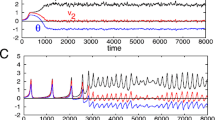Abstract
We propose a network model in which the communication between its elements (cells, neurons and lymphocytes) can be established in various ways. The system evolution is driven by a set of equations that encodes various degrees of competition between elements. Each element has an “internal plasticity threshold” that, by setting the number of inputs and outputs, determines different network global topologies.
Preview
Unable to display preview. Download preview PDF.
Similar content being viewed by others
References
Bui, J.D., Calbo, S., Hayden-Martinez, K., Kane, L.P., Gardner, P., Hedrick, S.M.: A role for CaMkII in T cell memory. Cell 10, 457–467 (2000)
Bienenstock, E.L., Cooper, L.N., Munro, P.W.: Theory for the development of neuron selectivity: orientation specificity and binocular interaction in visual cortex. J. Neurosci. 2, 32–48 (1982)
Castellani, G.C., Giberti, C., Franceschi, C., Bersani, F.: Stable state analysis of an immune network model. Int. J. Chaos Bif. 8(6), 1285–1301 (1998)
Bazzani, A., Remondini, D., Intrator, N., Castellani, G.C.: The effect of noise on a class of energy-based learning rules. Neural Comput. 15(7), 1621–1640 (2003)
Castellani, G.C., Intrator, N., Shouval, H., Cooper, L.: Solution of the bcm learning rule in a network of lateral interacting nonlinear neurons. Network 10, 111–121 (1999)
Coutinho, A.: Beyond clonal selection and network. Immunol. Rev. 110, 63–87 (1989)
Castellani, G.C., Quinlan, E.M., Cooper, L.N., Shouval, H.Z.: A biophysical model of bidirectional synaptic plasticity: Dependence on ampa and nmda receptors. PNAS 98(22), 12772–12777 (2001)
De Boer, R.J.: Symmetric idiotypic networks: Connectance and switching stability and suppression. Bull. Math. Biol. 55, 745–780 (1993)
Remondini, D., Bazzani, A., Franceschi, C., Bersani, F., Verondini, E., Castellani, G.: Role of connectivity in immune and neural network models: memory development and aging. Riv. Biol. 96(2), 225–239 (2003)
Hoffmann, G.W., Kion, T.A., Forsyth, R.B., Soga, K.G., CooperWillis, A.: The n-dimensional network. In: Perelson, A.S. (ed.) Theoretical Immunology, Part 2, p. 291. Addison-Wesley, Reading (1988)
Hayden-Martinez, K., Kane, L.P., Hedrick, S.M.: Effects of a constitutively active form of calcineurin on t cell activation and thymic selection. J. Immunol. 165, 3713–3721 (2000)
Hopfield, J.J.: Neural networks and physical systems with emergent collective computational abilities. Proc. Natl. Acad. Sci. U.S.A. 79(8), 2554–2558 (1982)
Hoffmann, G.W.: A neural network model based on the analogy with the immune system. J. Theor. Biol. 122, 33–67 (1986)
Intrator, N., Cooper, L.N.: Objective function formulation of the BCM theory of visual cortical plasticity: Statistical connections, stability conditions. Neural Networks 5, 3–17 (1992)
Jerne, N.K.: Towards a network theory of immune system. Annu. Immunol. 125, 373–389 (1974)
Perelson, A.S.: Immune network theory. Immunol. Rev. 110, 5–36 (1989)
Perelson, A.S.: Mathematical approaches in immunology. In: Andersson, S.I. (ed.) Theory & Control of Dynamical Systems, pp. 200–230. World Scientific, Singapore (1992)
Tieri, P., Valensin, S., Franceschi, C., Morandi, C., Castellani, G.C.: Memory and selectivity in evolving scale-free immune networks. In: Timmis, J., Bentley, P.J., Hart, E. (eds.) ICARIS 2003. LNCS, vol. 2787, pp. 93–101. Springer, Heidelberg (2003)
Tieri, P., Valensin, S., Latora, V., Castellani, G.C., Marchiori, M., Remondini, D., Franceschi, C.: Quantifying the relevance of different mediators in the human immune cell network. Bioinformatics 21, 1639–1643 (2005)
Stewart, J., Varela, F.J.: Exploring the meaning of connectivity in the immune network. Immunol. Rev. 110, 37–61 (1989)
Watts, D.J., Strogatz, S.H.: Collective dynamics of “small-world” networks. Nature 393, 440–442 (1998)
Barabasi, A.L., Albert, R.: Statistical mechanics of complex networks. Rev. of Mod. Phys. 74, 48–94 (2002)
Author information
Authors and Affiliations
Editor information
Editors and Affiliations
Rights and permissions
Copyright information
© 2006 Springer-Verlag Berlin Heidelberg
About this paper
Cite this paper
Remondini, D. et al. (2006). A General Learning Rule for Network Modeling of Neuroimmune Interactome. In: Apolloni, B., Marinaro, M., Nicosia, G., Tagliaferri, R. (eds) Neural Nets. WIRN NAIS 2005 2005. Lecture Notes in Computer Science, vol 3931. Springer, Berlin, Heidelberg. https://doi.org/10.1007/11731177_36
Download citation
DOI: https://doi.org/10.1007/11731177_36
Publisher Name: Springer, Berlin, Heidelberg
Print ISBN: 978-3-540-33183-4
Online ISBN: 978-3-540-33184-1
eBook Packages: Computer ScienceComputer Science (R0)




